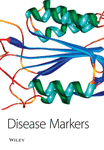Relationship of the 1793G-A and 677C-T Polymorphisms of the 5,10-Methylenetetrahydrofolate Reductase Gene to Coronary Artery Disease
Abstract
Numerous studies have investigated the relationship between polymorphisms, in particular 677C-T and 1298A-C, of the methylene-tetrahydrofolate reductase (MTHFR) gene and coronary artery disease (CAD) with conflicting results. This study investigates the potential association of two point mutations in MTHFR, 677C-T and 1793G-A, along with other risk factors, with CAD. This is the first hospital-based study to investigate 1793G-A in this context. Genotype analysis was performed on 729 Caucasians and 66 African Americans undergoing coronary angiography using a novel PCR-based assay involving formation of Holliday junctions. Allelic frequencies for 677C-T were 66.2% C and 33.8% T for Caucasians and 90.9% C and 9.1% T for African Americans. With respect to the 1793G-A polymorphism, allelic frequencies were 94.7% G and 5.3% A for Caucasians and 99.2% G and 0.8% A for African Americans. Disease associations were examined in the Caucasian patients due to their greater genotype variability and larger number in the patient cohort. Results suggest that neither 677CT heterozygotes (OR-1.36; 95% CI 0.95 to 1.96) nor mutant homozygotes (OR-0.73; 95% CI 0.44 to 1.20) have either an increased or decreased risk for CAD compared to the 677CC genotype. Likewise, the 1793GA genotype did not demonstrate a statistically significant association with CAD compared to 1793GG patients (OR-0.79; 95% CI 0.47 to 1.33). Mean homocysteine levels (μmol/L) increased from normal to mutant for 677C-T (677CC: 10.2; 677CT: 11.0; 677TT: 11.6) and normal to heterozygous in 1793G-A (1793GG: 10.7; 1793GA: 11.5). These MTHFR polymorphisms did not contribute to the prediction of clinically defined CAD in Caucasians.




